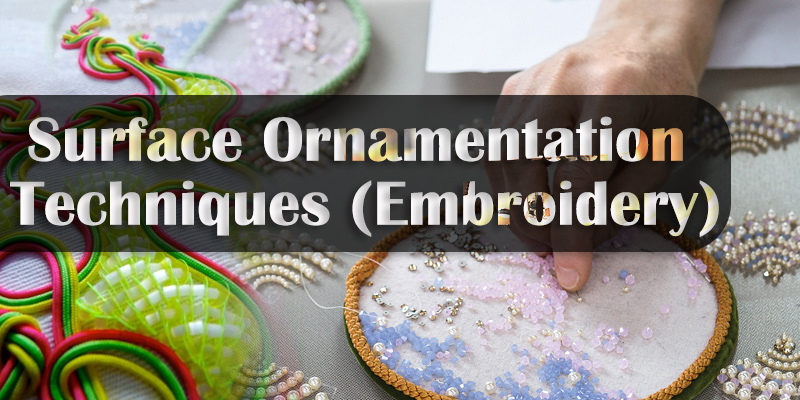iti
15 April 2025

ITI Surface Ornamentation Techniques (Embroidery) Syllabus (English)
Course Overview
- Trade Name: Surface Ornamentation Techniques (Embroidery)
- Duration: 1 Year (2 Semesters)
- NSQF Level: Level 4
- Eligibility: 8th Grade Pass
- Objective: To train candidates in hand and machine embroidery techniques for decorating fabrics, preparing them for roles such as embroiderers, design assistants, or quality inspectors in garment and textile industries, or for self-employment in embroidery businesses.
- Certification: National Trade Certificate (NTC) by NCVT
Detailed Syllabus
Semester 1
Trade Theory
- Introduction to Embroidery: Definition, history, types (hand, machine), applications in garments and home décor.
- Textile Fibers: Properties of cotton, silk, wool, polyester; suitability for embroidery.
- Tools and Equipment: Needles, hoops, frames, scissors, sewing machines; types, uses, and maintenance.
- Embroidery Threads: Types (cotton, silk, metallic), thread count, color selection.
- Basic Stitches: Running, back, chain, stem, satin, cross; their uses in patterns.
- Safety Practices: Needle handling, machine safety, PPE (thimbles, gloves), ergonomics.
- Design Principles: Elements of design (line, shape, color), transferring patterns to fabric.
Trade Practical
- Tool Handling: Practicing with needles, hoops, scissors; setting up embroidery frames.
- Fabric Preparation: Marking and stretching fabrics (cotton, silk) on hoops/frames.
- Basic Stitches: Creating samples of running, chain, satin, and cross stitches on cotton fabric.
- Thread Selection: Choosing threads for specific designs; testing color fastness.
- Pattern Transfer: Tracing designs using tracing paper, carbon sheets, or stencils.
- Safety Drills: Practicing safe needle disposal, machine cleaning, posture correction.
- Project Work: Embroidering a simple floral motif on a cotton fabric sample using basic stitches.
Hours: Theory: 160 hours | Practical: 240 hours
Semester 2
Trade Theory
- Advanced Stitches: French knot, bullion, feather, herringbone, shadow work; combining stitches for complex designs.
- Machine Embroidery: Types (zigzag, computerized), machine parts, threading, and settings.
- Traditional Embroidery: Overview of Indian styles (Phulkari, Kantha, Zari, Chikankari), their motifs and techniques.
- Surface Ornamentation: Appliqué, beadwork, sequins, mirror work; integration with embroidery.
- Quality Control: Inspecting embroidery for evenness, tension, and durability; defect analysis.
- Entrepreneurship: Starting an embroidery unit, costing materials, market trends in designer textiles.
- Environmental Practices: Managing thread waste, eco-friendly dyes, sustainable fabric choices.
Trade Practical
- Advanced Stitches: Practicing French knot, bullion, and shadow work on silk/woolen fabrics.
- Machine Embroidery: Operating zigzag/computerized machines; embroidering motifs on garments.
- Traditional Styles: Creating samples of Phulkari, Kantha, or Chikankari patterns.
- Ornamentation Techniques: Adding appliqué, beads, sequins to embroidered designs.
- Quality Checks: Inspecting samples for stitch uniformity, thread tension; correcting defects.
- Field Exposure: Hands-on training in garment units or embroidery workshops (2-4 weeks).
- Project Work: Designing and embroidering a complete decorative piece (e.g., cushion cover) with advanced stitches and ornamentation.
Hours: Theory: 160 hours | Practical: 240 hours
Additional Components
- Workshop Calculation and Science
- Calculations: Fabric measurements, thread consumption, costing embroidery designs.
- Science: Fiber tensile strength, dye chemistry, light effects on thread colors.
- Hours: 40 hours/year
- Employability Skills
- Communication: Client interaction, presenting designs, teamwork.
- IT Literacy: Using design software (e.g., CorelDRAW basics), online market research.
- Soft Skills: Time management, resume writing, interview preparation.
- Hours: 60 hours/year
Assessment and Certification
- Exams:
- Theory: Written exams per semester (MCQs, descriptive questions).
- Practical: Tasks like creating embroidered samples, machine embroidery, defect correction.
- Evaluation Criteria: Stitch precision, design creativity, safety practices, project quality.
- Certification: NCVT National Trade Certificate (NTC) upon passing both semesters, globally recognized.
Career Opportunities
- Employment: Embroiderer, design assistant, quality inspector in garment factories, fashion houses, or textile units.
- Self-Employment: Embroidery workshop, freelance designer, online craft retail.
- Further Studies: Diploma in Fashion Design, certifications in machine embroidery, or entrepreneurship courses.
Trade Type
- 15 views